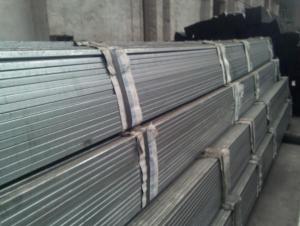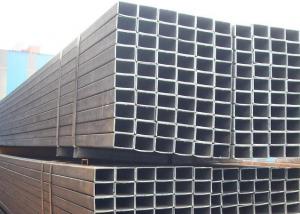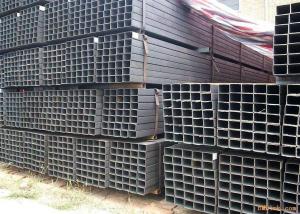High Quality Hollow Section-Rectangle Tubes
- Loading Port:
- China Main Port
- Payment Terms:
- TT or L/C
- Min Order Qty:
- 5 m.t. m.t.
- Supply Capability:
- Based On Order m.t./month
OKorder Service Pledge
OKorder Financial Service
You Might Also Like
High Quality Hollow Section-Square Tubes
Usage/Applications Of High Quality Hollow Section-Square Tubes:
It is widely used in building, machine, chemical equipment, automobile industrial, container, it is also applied to agriculture and mine machine.
Standard Of High Quality Hollow Section-Square Tubes:
ASTM A500, GB6728
Steel Grade Of High Quality Hollow Section-Square Tubes:
ASTM A500: A, B, C
GB6728:Q195,Q215,Q235,Q345
Size of High Quality High Quality Hollow Section-Square Tubes:
*Remark: Besides below sizes, we also can arrange production based on requirement of customers
|
Sizee(mm) |
Thickness(mm) |
|
20×10 |
0.6-1.0 |
|
25×12 |
0.6-1.0 |
|
38×19 |
0.6-1.5 |
|
50×25 |
0.6-1.5 |
|
50×30 |
1.6-3.0 |
|
60×40 |
1.5-3.5 |
|
75×50 |
1.5-4.0 |
|
80×40 |
1.5-4.0 |
|
100×50 |
2.0-6.0 |
|
100×60 |
2.0-6.0 |
|
100×75 |
2.0-6.0 |
|
120×60 |
3.0-6.0 |
|
120×80 |
3.0-6.0 |
|
125×50 |
3.0-6.0 |
|
125×75 |
3.0-6.0 |
|
150×50 |
3.0-6.0 |
|
150×75 |
3.0-6.0 |
|
150×100 |
4.0-12 |
|
160×80 |
4.0-6.0 |
|
175×100 |
4.0-12 |
|
200×100 |
4.0-12 |
|
200×150 |
4.0-12 |
|
250×150 |
5.0-12 |
|
300×200 |
5.0-12 |
|
400×200 |
5.0-12 |
Chemical Composition Of High Quality Hollow Section-Square Tubes (%)
|
Chemical Requirement | ||||
|
|
Composition % | |||
|
|
Grade A |
Grade B | ||
|
|
Heat |
Product |
Heat |
Product |
|
Element |
analysis |
analysis |
analysis |
analysis |
|
Carbon max |
0.26 |
0.3 |
0.22 |
0.26 |
|
Manganese max |
… |
… |
1.4 |
1.45 |
|
Phosphorus, max |
0.035 |
0.045 |
0.03 |
0.04 |
|
Sulfur max |
0.035 |
0.045 |
0.02 |
0.03 |
|
Copper, when copper steel is specified, min |
0.2 |
0.18 |
0.2 |
0.18 |
|
Where an ellipsis (...)appears in this table, there is no requirement | ||||
|
For each reduction of 0.01 percentage point below the specified maximum for carton, and increase of 0.06 percentage point above the specified maximum for manganese is permitted, up to a maximum of 1.50% by heat analysis and 1.6% by product analysis | ||||
Mechanical Properties Of High Quality Hollow Section-Square Tubes
|
Tensile Requirement | ||
|
|
Grade A |
Grade B |
|
Tensile strength, min, psi (Mpa) |
48000 (400) |
70000 (483) |
|
Yield strength, min, psi (Mpa) |
36000 (250) |
50000 (345) |
|
Elongation in 2 in. (50.8mm), min, % |
23 |
23 |
GB6728:
|
Steel Grade |
CHEMICAL COMPOSITION |
MECHANICAL PROPERTIES | ||||||
|
|
C (%) |
Si (%) |
Mn (%) |
P(%) Max |
S (%) Max |
YS(Mpa) Min |
TS(Mpa) Min |
El (%) Min |
|
Q195 |
0.06-0.012 |
0.3 |
0.25-0.5 |
0.45 |
0.5 |
195 |
315 |
22 |
|
Q215 |
0.09-0.15 |
0.3 |
0.25-0.55 |
0.45 |
0.5 |
215 |
335 |
22 |
|
Q235 |
0.12-0.22 |
0.3 |
0.3-0.7 |
0.45 |
0.45 |
235 |
375 |
20 |
|
Q345 |
0.20 |
0.55 |
1.0-1.6 |
0.45 |
0.45 |
345 |
510 |
21 |
Packaging & Delivery Of H High Quality Hollow Section-Square Tubes:
Packed in bundles, each bundle with 6-8 steel stripes and 2 nylon strips Or one by one Or Nested into Containers
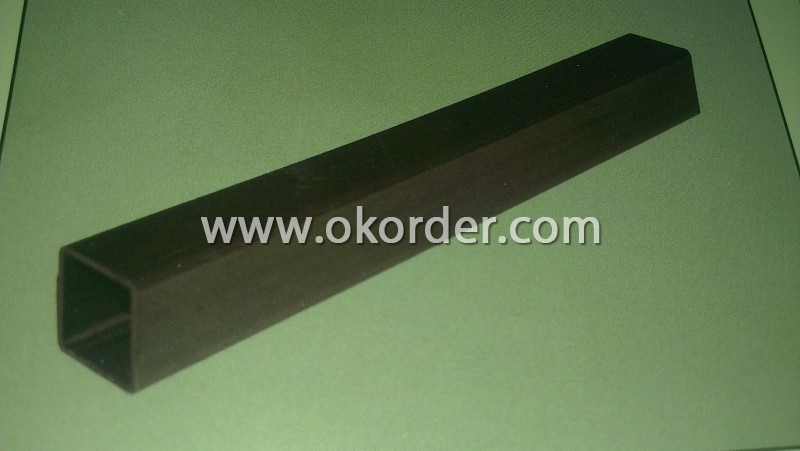
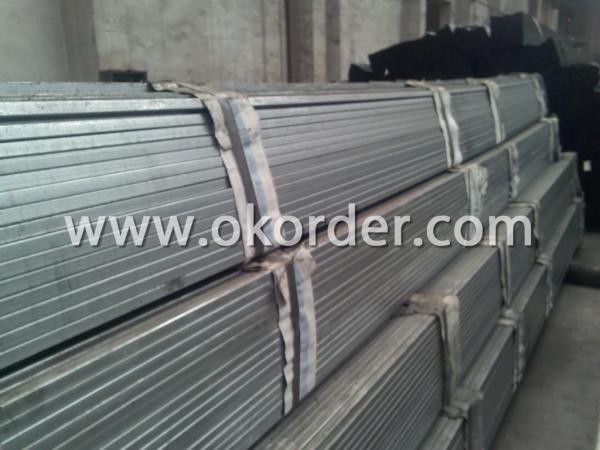
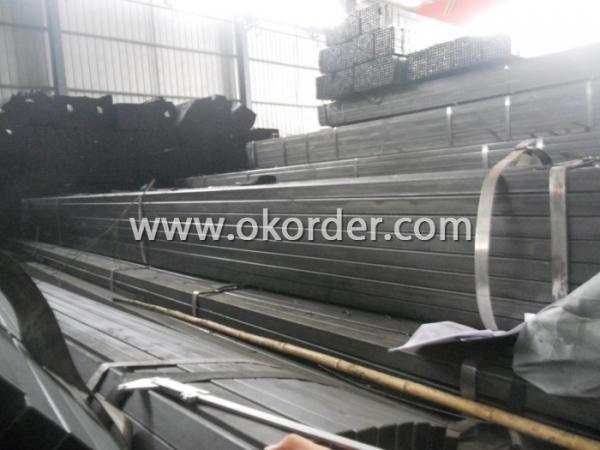
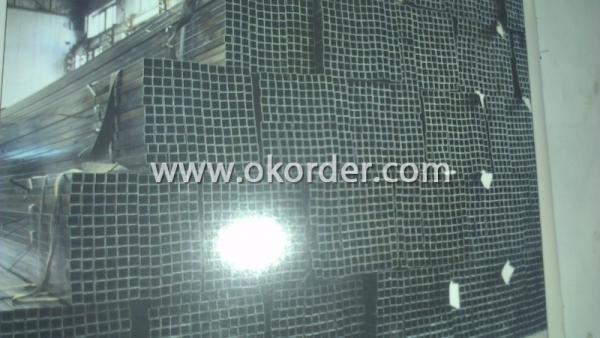
- Q:Are steel pipes suitable for underground mining operations?
- Yes, steel pipes are suitable for underground mining operations. Steel pipes are known for their durability, strength, and resistance to corrosion, making them ideal for use in harsh underground mining environments. They can withstand high pressure and are capable of transporting various substances, such as water, air, or mining materials, with reliability and efficiency. Additionally, steel pipes can be customized to meet specific mining requirements, ensuring their suitability for underground operations.
- Q:Can steel pipes be used for conveying hazardous chemicals?
- Certainly, hazardous chemicals can indeed be conveyed through the use of steel pipes. Renowned for their exceptional strength and durability, steel pipes are ideally suited for the handling of various substances, including those that are hazardous. Their ability to withstand both high pressure and temperature ensures the secure transportation of these chemicals. Furthermore, steel pipes possess outstanding resistance to corrosion, a critical factor when dealing with potentially dangerous and corrosive materials. In addition, the ease with which steel pipes can be welded and connected allows for the establishment of a dependable and impervious transport system. Nevertheless, it is imperative to carefully consider the specific requirements of the chemicals being transported and diligently ensure that the steel pipes are appropriately designed, coated, and maintained, thereby averting any potential risks or reactions that may arise with the hazardous substances.
- Q:What are the different standards for steel pipes?
- There are several different standards for steel pipes, including ASTM (American Society for Testing and Materials), API (American Petroleum Institute), and ASME (American Society of Mechanical Engineers). These standards specify the requirements for various aspects of steel pipes, such as their dimensions, chemical composition, mechanical properties, and testing procedures. These standards ensure that steel pipes meet the necessary quality and safety standards for their intended applications.
- Q:Is the seamless steel pipe used in the market hot or cold drawn?
- Outside diameter 89, most are cold drawn, more than 89 hot rolling.
- Q:How are steel pipes used in the renewable energy industry?
- Steel pipes are widely used in the renewable energy industry for various purposes. They are commonly used in the construction of wind turbine towers, where they provide structural support and stability. Steel pipes are also used in the installation of solar panel systems, serving as a reliable conduit for transporting fluids, such as water or heat transfer fluids, within the system. Additionally, steel pipes are utilized in the transportation of renewable energy resources, such as natural gas or hydrogen, as they offer durability and strength to withstand high-pressure conditions.
- Q:How are steel pipes insulated for thermal efficiency?
- Steel pipes are insulated for thermal efficiency using various methods such as applying insulation materials like fiberglass, mineral wool, or foam to the surface of the pipes. This insulation helps to prevent heat loss or gain, thereby improving the energy efficiency of the pipes. Additionally, protective outer layers such as aluminum or PVC jackets are often added for extra insulation and to provide resistance against moisture and external elements.
- Q:Can steel pipes be used for fencing or railing?
- Yes, steel pipes can be used for fencing or railing. Steel pipes are strong, durable, and resistant to corrosion, making them a suitable option for fencing or railing applications. They can provide a sturdy and secure barrier while also offering an aesthetically pleasing look.
- Q:How are steel pipes used in the manufacturing of desalination plants?
- Steel pipes are used in the manufacturing of desalination plants for various purposes such as transporting seawater, brine, and treated water within the plant. They provide durability, corrosion resistance, and the necessary strength to withstand high-pressure conditions, ensuring the efficient operation and long-term reliability of the desalination process.
- Q:How are steel pipes threaded for easy installation?
- The process of threading steel pipes enables convenient installation by creating grooves or ridges in the pipe, forming a spiral pattern that facilitates connection with other threaded components like fittings or valves. There are two commonly employed methods for threading steel pipes: manual threading and machine threading. Manual threading involves the utilization of a handheld tool called a pipe die. This die, equipped with sharp teeth, cuts into the pipe while it is rotated. The pipe is secured in a vise or held firmly by hand, and the die is applied to the pipe's end. As the die rotates around the pipe, threaded grooves are formed. Executing this process necessitates skill and precision to ensure accurate and properly aligned threads. In contrast, machine threading is a more automated procedure. It utilizes a pipe threading machine, which possesses a die head that automatically cuts the threads into the pipe. The machine holds the pipe securely and rotates it while the die head moves along the pipe's length, creating the threads. Machine threading is faster and more efficient than manual threading, making it ideal for large-scale production or projects. Regardless of the chosen method, it is imperative to ensure that the threads are clean and devoid of debris or burrs. This is crucial for effortless installation and to prevent leaks or other complications. Following threading, the pipes are generally inspected to ensure compliance with the required specifications. Threading steel pipes allows for uncomplicated installation as the threaded ends can be readily screwed into fittings, valves, or other pipes possessing compatible threads. This threaded connection creates a tight seal, rendering it suitable for various applications such as plumbing, gas lines, or industrial piping systems.
- Q:How are steel pipes used in the manufacturing of conveyor systems?
- Steel pipes are commonly used in the manufacturing of conveyor systems to provide a durable and reliable structure for transporting various materials. They are typically used as the main framework for the conveyor system, supporting the conveyor belt and other components. Steel pipes are known for their strength and resistance to wear and tear, making them ideal for handling heavy loads and withstanding continuous use. Additionally, steel pipes can be easily shaped and welded, allowing for customization and flexibility in conveyor system design.
1. Manufacturer Overview |
|
|---|---|
| Location | Hebei, China |
| Year Established | 1988 |
| Annual Output Value | Above One Hundred Million RMB |
| Main Markets | Main land; Southeast Asia; Middle East; Africa |
| Company Certifications | ISO 9002:2010;API 5L |
2. Manufacturer Certificates |
|
|---|---|
| a) Certification Name | |
| Range | |
| Reference | |
| Validity Period | |
3. Manufacturer Capability |
|
|---|---|
| a)Trade Capacity | |
| Nearest Port | Tianjin |
| Export Percentage | 30%-50% |
| No.of Employees in Trade Department | 201-500 People |
| Language Spoken: | English; Chinese |
| b)Factory Information | |
| Factory Size: | 50,000 square meters |
| No. of Production Lines | Above 15 |
| Contract Manufacturing | Meicai Metal Trading Co.Ltd |
| Product Price Range | Average |
Send your message to us
High Quality Hollow Section-Rectangle Tubes
- Loading Port:
- China Main Port
- Payment Terms:
- TT or L/C
- Min Order Qty:
- 5 m.t. m.t.
- Supply Capability:
- Based On Order m.t./month
OKorder Service Pledge
OKorder Financial Service
Similar products
New products
Hot products
Related keywords

